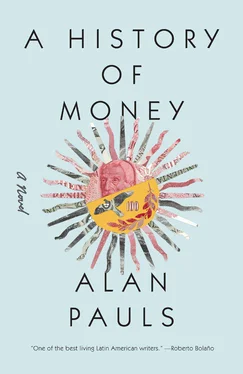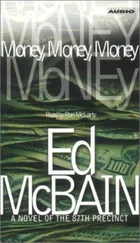She’s wearing blue boat shoes with no socks. The ankle of one leg scratches the calf of the other, with the absentminded aptitude with which certain parts of the body do things without informing the rest. He decides to follow her. He doesn’t even have to think about it. He attends to everything else — the closure of the account and the last pesos they steal from him, which he pays impatiently, without saying a word, before just as impatiently squeezing the indifferent hand that’s presented to him through the hole in the window by way of goodbye — judiciously and imperceptibly, in a hazy background like the ones in which sleepwalkers carry out their simulations of gestures. He looks for the woman, wondering which of the bank’s secret folds must have swallowed her, and then sees her walking toward the door that leads to the safe deposit boxes. The buzzer sounds. The woman struggles with the door for a few seconds (seconds that he could use to go over and relay the secrets he no longer needs: the light yank toward yourself and subsequent push that open it) and then disappears to the other side. It’s like he can see her, like he’s already watching her on one of the security cameras that will be installed a few years later, before whose unsleeping eye the successors of the employee who served him will open other clients’ safe deposit boxes in order to prove before a third party, and before nobody, that they’re empty. He knows exactly what she’ll do in there. He knows how long she’ll spend isolated from the world, unassailable, her very being momentarily transformed into wealth; how long it will take her to pass through the bars, unlock the door to the unit, take out the elongated coffin, put her treasures inside, slot the box back in, sign the paperwork, and leave. And when she leaves, he’s waiting for her outside, looking inattentively at the window display of the bookshop next door. By now, there are no prices: values change so rapidly that booksellers have stopped trying to keep up.
Five months later, he reappears in the same frame — the bookshop window (now with other books in it, priced in pesos rather than australs, because there are now ten thousand australs to the peso) and the same slice of the bank’s façade with its red granite column and the pane of a glass door with a spray can’s insulting stamp on it — with shorter hair, an anachronistic mustache that would be at home on a seventies porn star, and an elegant navy-blue wool duffle coat in place of the old sheepskin one. He goes into the bank, stands in front of the cashier’s window, and, showing no sign of emotion, says, “Box two, unit three.” As he tells his father, who follows his romantic adventures with a vague interest that’s too halfhearted to outlast the surprise of novelty, it’s possible that he followed her, approached her, and finally, after a quiet and tenacious courtship, made her fall in love with him for this purpose alone, because he’s obsessed by the metal coffin she’s unwittingly inherited from him and wants to be able to say, once more, the four words of banking jargon that designate it, or simply because he can’t bear the idea of having to stop saying them. This is what relationship experts call a connection, a word that casts as a romantic miracle something that in truth isn’t much more than a phenomenon of mechanical compensation, not fundamentally very different from those involving a long-sighted eye and the lens that corrects it, or a wooden platform that lengthens a short leg just the right amount. He’s in the game again. Will he be able to do it? His heiress — as he privately thinks of her, feeling the secret joy of a creditor mentally delighting in the obliviousness of a debtor who doesn’t yet know quite how much he owes — is forty-two, the wife of a playwright or a screenwriter or a folk lyricist, in any case a successful man endowed with the bad taste to die during a trip to the interior of the country (after a cow looking for something to graze on in the night cuts him off in the middle of the road); with the courtesy not to forget the relatives he leaves behind, to whom he periodically sends money from the beyond (as playwrights, screenwriters, and lyricists call their royalty payments); and with an intractable son with an acne-strewn face, who wears clothes two sizes too large, abhors his father’s literary heritage with all his heart despite never having read it (“What for, if I abhor him with all my heart?”), and is pretty much at war with the world, Sonia, the widow, and her Prince Valiant haircut. A fixation that dates to time immemorial: she already has it in the uniformly blurry photos of her fifteenth birthday party. And no, it’s not a wig, as he is suitably disappointed to discover the first time he holds the nape of her neck and draws her head toward him to kiss her, standing in the bright galley kitchen of what will soon, very soon, be his new home, a few seconds after the bulb shatters almost on top of their heads, throwing a veil of darkness on the encounter, and a few before the teenage vandal bursts in on his skates, only just avoiding knocking them into the papered wall.
This type of attack is common currency in the early days. The boy leaves him waiting, hangs up the phone, doesn’t pass on his messages. He tells him that Sonia isn’t home (when she’s just poured herself a glass of wine to wait for him), that she doesn’t want to see him (when she’s just put on perfume for him), that he’ll never set foot in the house again (when he already has two pairs of shoes in the closet). The bottle of champagne he brings (which he drives himself crazy looking for) shows up two days later among the cleaning things in one of the kitchen cupboards, empty, of course, and the tub of ice cream in the bottom drawer of his father’s desk, leaking its multicolored juices on the original manuscript of Danger, the oratorio the dramaturge was writing when he embedded the front of his Honda Civic in that cow’s flabby flank. After an unexpectedly passionate soiree on the couch, he finds chewing gum stuck in the buttonholes of his sheepskin coat. When he goes home and tries to open his door, he discovers that he doesn’t have his keys — the boy is at that moment using them to remove an antediluvian mat of hair and semen from the drain in the bathtub. He doesn’t allow it to intimidate him. He only has to see how the delinquent treats the supermarket delivery boy, the guy at the video store, and his guitar teacher to realize that it’s not personal, even if the delivery boy, the video store guy, and the guitar teacher don’t also get the accusations he shouts at the top of his lungs, seeming as though he’s on the verge of a fit, like some sort of epileptic Hamlet, of aspiring to a throne that isn’t rightfully theirs. Where does he — he, in whose eyes any new situation tends to look like evil and danger — find his lion tamer’s levelheadedness and strange detachment? Something makes him immune to this type of rage, something even he didn’t know he had, and like any lucky weapon — as he learns very early on thanks to the chapters of his superhero comics that reveal how the superheroes discovered their powers — it’s doubly effective because it’s power in its purest form, used without control or calculation. Little by little — like someone realizing that the dreams he’s been having, his ideas, the things he buys, the rituals he surrenders himself to, all of these signs, though they’re scattered in time and space, in fact constitute just one thing, one crucial need, to which from that moment on he will unhesitatingly sacrifice his life if necessary — he discovers that he likes being where he is now, in the middle, in neither a central position, like a lover barging into a wake and abducting the widow while she’s still warm from sobbing, nor a subordinate one, like a slave offering his services as compensation for her grief. In fact, he’s the one who intercepts the homemade ammunition of rolled-up bread filled with coins that the boy cheerfully fires at his mother, using his body as a shield. And he’s the one who holds talks with the hooligan when he shuts himself in his room. He comes and goes, gives and takes, announces and relays. And for once, luck is on his side. One afternoon, in one of the neighborhoods full of low-rise houses that still exist in Buenos Aires, he stumbles upon a near-deserted pharmacy and spies a bar of the astringent soap he used to stop an untimely bout of acne when he was twenty-six, sitting helplessly in one of its dusty windows like the star of a very old film that was never released. He goes in, buys every bar they have — so that the scent of sulfur intoxicates him on the way home — and promises to give one to the boy if he doesn’t follow through with his threat to make a bonfire of his clothes in the middle of his bedroom. The boy accepts. Three days later, his cheeks and the spot between his eyebrows — formerly no-man’s-lands ravaged by the sebum’s troops — are clean, soft, and smooth, and that night the boy comes home making out with a girlfriend of sorts. One night while they’re eating together (if eat is the right word for this slow, phlegmatic dissection of two eggplants parmesan), the boy asks permission to leave the table and isn’t given it, but as usual leaves anyway, dropping his napkin and showering the floor with breadcrumbs. Sonia sobs and dries her tears with a somewhat dirty napkin, and he consoles her and ends up sitting next to her, on her seat, both of them uncomfortable, while the eggplant that’s been left half-eaten because of her tears turns to liquid. At some point he gets up and goes to the bathroom, and on the way he catches the boy in his mother’s room, stealing money from her purse. He’s about to walk on by without saying anything, but suddenly he stands still and looks straight at him until the boy stops counting notes and looks back at him, startled.
Читать дальше












